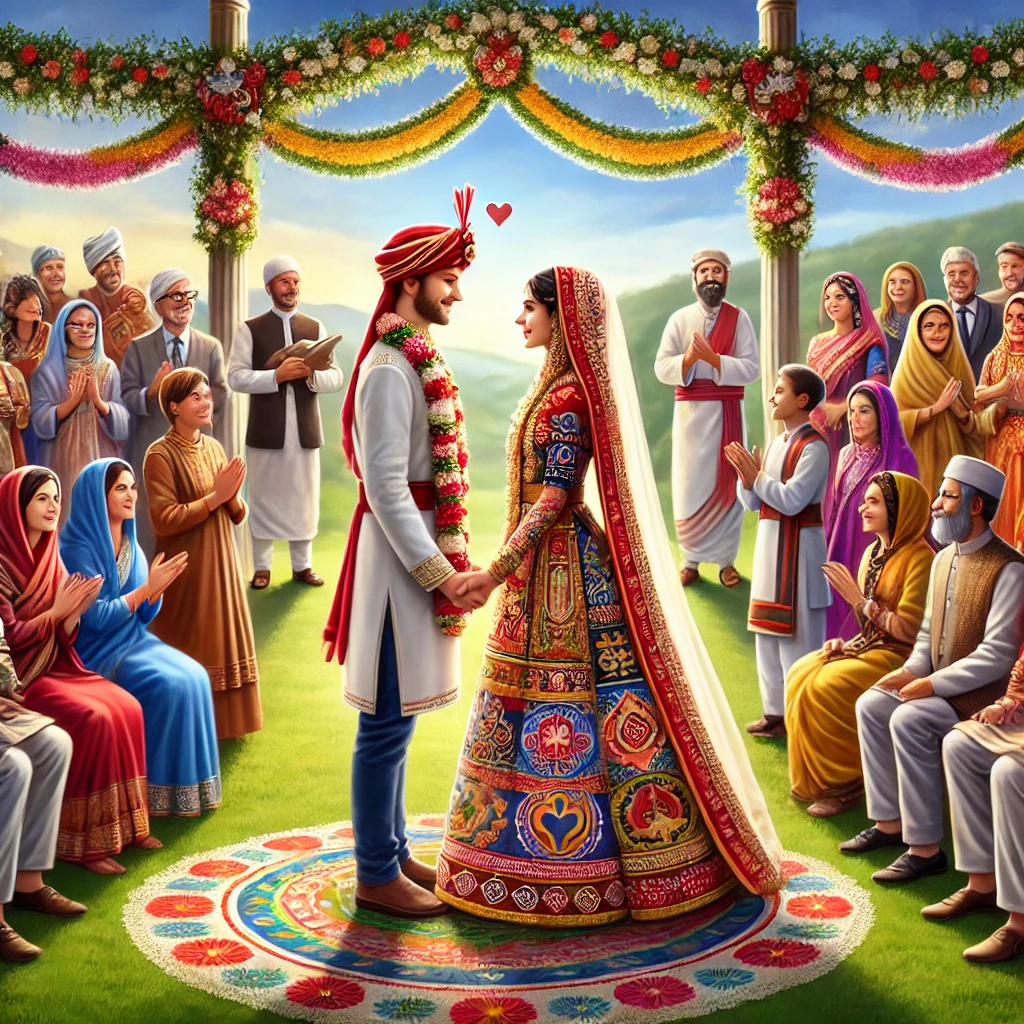Inter Religion Marriage In Patna
TK divorce & Family lawyer is best for Inter Religion marriage in Patna . Mr. Khurshid Alam is best Advocate in Patna for Inter religion marriage.
What is Inter-Religion Marriage
Inter-religion marriages in Patna, like in other parts of India, are governed by the Special Marriage Act, 1954, which provides a legal framework for couples from different religions to marry without the need for religious conversion. The process requires filing a notice of intended marriage at the Marriage Registrar’s office, followed by a 30-day notice period during which objections can be raised. If you’re planning an inter-religion marriage in Patna, it’s essential to understand the legal requirements and rights under the law to make informed decisions.

Why is Inter-Religion Marriage a Subject of Legal Scrutiny?
To simplify the process, it’s crucial to seek legal advice to ensure compliance with legal procedures and safeguard your rights. For those planning inter-religion marriages in Patna, expert guidance can help navigate the complexities and ensure a smooth, lawful marriage.
India’s legal framework is a complex blend of personal laws based on religion and secular laws that apply universally. Inter-religion marriages usually fall under the purview of the Special Marriage Act, 1954 (SMA), a secular law that allows individuals of different religions to marry without converting to their partner’s religion. The Act ensures a legal mechanism for registration and validation of such marriages while safeguarding individual rights.
Despite these provisions, societal resistance, family objections, and misuse of religious conversion laws often complicate inter-religion marriages. The issue has sparked debates on personal freedom, secularism, and social harmony.
Why are Inter-Religion Marriages Important?
Inter Religion Marriage In Patna have gained significance in India as they promote social integration, religious tolerance, and individual liberty. India’s Constitution guarantees fundamental rights, including the right to marry anyone of one’s choice, regardless of religion, caste, or creed. Inter-religion marriages challenge traditional social structures and contribute to a more inclusive society.
The importance of inter-religion marriages lies in the following aspects:
- Promoting Secularism: Interfaith unions support India’s secular foundation by fostering unity among diverse religious groups.
- Protecting Personal Freedom: They reflect the constitutional right of individuals to choose their life partners without religious or societal constraints.
- Challenging Social Norms: Inter-religion marriages question and challenge age-old caste, religious, and community-based restrictions in Indian society.
However, despite their importance, these marriages often face societal resistance, including familial objections, social stigma, and legal challenges, which is where judicial interpretations come into play.
The Role of the Indian Constitution
Article 14 (Right to Equality)
- Ensures equal treatment of spouses before the law, irrespective of gender.
Article 15 (Prohibition of Discrimination)
- Prohibits gender-based discrimination in marital rights and remedies.
Article 21 (Right to Life and Personal Liberty)
- Protects individuals from marital conditions that violate dignity or personal liberty, forming the basis for laws against cruelty and harassment.
Legal Framework for Inter-Religion Marriage
The Special Marriage Act, 1954 is the cornerstone of legal provisions for Inter Religion Marriage In Patna. Unlike personal laws that are based on religion (e.g., Hindu Marriage Act, Muslim Personal Law), the Special Marriage Act provides a secular framework for marriage. Key aspects of this law include:
- Secular Nature: The Act does not require individuals to convert to the religion of their spouse.
- Marriage Registration: It allows for legal registration of marriages, ensuring that the marriage is recognized by the state.
- Freedom to Marry: The law allows individuals from different religions, castes, and even nationalities to marry.
- Minimum Age for Marriage: The Act sets the legal age of marriage at 21 for men and 18 for women.
- Public Notice Requirement: A notice of intended marriage is published to ensure transparency.
While the Special Marriage Act ensures that Inter Religion Marriage In Patna are legally protected, it often faces social challenges, including familial and communal opposition, which need to be addressed through judicial interpretation.
Constitutional Perspective
Right to Equality (Article 14)
- Ensures equal treatment of spouses before the law, irrespective of gender.
Article 15 (Prohibition of Discrimination)
- Prohibits gender-based discrimination in marital rights and remedies.
Right to Life and Personal Liberty (Article 21)
- Protects individuals from marital conditions that violate dignity or personal liberty, forming the basis for laws against cruelty and harassment.

Let us help you with seamless inter-religion marriage registration in Patna. Contact us today!
Landmark Judgments on Inter-Religion Marriage
These provisions affirm that inter-religion marriages are constitutionally protected. The judiciary has consistently upheld these rights in landmark judgments.
Several landmark judgments by the Indian judiciary have contributed to the evolution of inter-religion marriage laws, emphasizing the protection of individual rights, the right to marry across religious lines, and the promotion of secularism.
1. Lata Singh v. State of Uttar Pradesh (2006)
The Lata Singh v. State of Uttar Pradesh (2006) case is one of the most significant rulings regarding inter-religion marriage. The Supreme Court ruled that adults have the right to marry someone of their choice, irrespective of religion, caste, or social status. The Court also stated that inter-religion marriages are legal and should be protected under the law, even if they are opposed by family members.
The judgment affirmed the Special Marriage Act, 1954 as a legal tool for inter-religion marriages and emphasized that adult individuals are free to choose their life partners without interference. The decision reinforced the right to freedom of choice and promoted the idea of marriage as a personal and private matter.
2. Shah Bano Case (1985)
While the Shah Bano case (1985) primarily focused on Muslim women’s rights under personal law, it also had implications for inter-religion marriages. The case highlighted the disparities in personal laws and paved the way for discussions on a uniform civil code.
Although the judgment itself did not directly address inter-religion marriage, it brought attention to the need for secular laws governing marriage and divorce, which could help in resolving legal issues arising from inter-religion marriages. The case illustrated the importance of the Special Marriage Act as a secular alternative for those wishing to marry outside their religious traditions.
3. K.S. Puttaswamy v. Union of India (2017)
The K.S. Puttaswamy v. Union of India (2017) case, in which the Supreme Court upheld the right to privacy as a fundamental right, significantly impacted the legal discourse around inter-religion marriages. The Court emphasized that privacy extends to personal decisions, including the right to marry a person of one’s choice, regardless of religion.
This judgment reinforced the notion that personal freedoms, including the freedom to marry, are protected under the Constitution of India. It implicitly supported the legal standing of inter-religion marriages and reiterated that individuals should not be subjected to social or religious constraints when choosing a life partner.
Comprehending the Role of Inter-Religion Marriage in Indian Jurisprudence
The significance of inter-religion marriage in Indian jurisdiction cannot be overstated. Inter-religion marriages challenge long-standing social norms, promote equality, and uphold the constitutional values of individual liberty and secularism. India’s Special Marriage Act, 1954 provides a legal pathway for couples who wish to marry across religious lines without the complications of conversion or societal restrictions.
Moreover, the Indian Constitution guarantees fundamental rights such as freedom of religion and the right to marry, ensuring that inter-religion marriages are not only legally valid but also constitutionally protected. The landmark judgments in Lata Singh v. State of Uttar Pradesh, Shah Bano (1985), and K.S. Puttaswamy (2017) have contributed significantly to reinforcing the legal protection of such marriages.
Services Provide By Us
Alimony and Maintenance in Patna
Contact best divorce lawyer Patna
Court Marriage in Patna
Divorce Advocate in Patna
Divorce Under Muslim Personal Law
Dowry and Domestic Violence
Inter Religion Marriage in Patna
Inter-Caste Court Marriage In Patna
Connect With Our Social media
Advocate Tabish Anmad
https://www.linkedin.com/in/advocate-tabish-ahmad-667015326
Our Legal Networks
Best Tax Law Firms in Bihar
List of all Honoble High Courts
Search Your Case
About Us

Proudly powered by Matrimonialmatters.in


